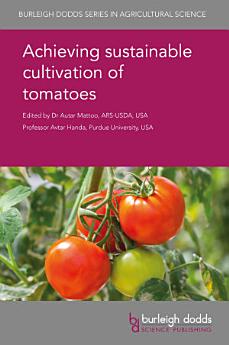Achieving sustainable cultivation of tomatoes
About this ebook
Professor Daniel Leskovar in Chronica Horticulturae
Tomatoes are the second most important vegetable crop in the world after potatoes. Originating in South America, they are now grown widely around the world. As the population continues to grow, there is a need to increase yields in the face of such challenges as climate change, threats from pests and diseases and the need to make cultivation more resource-efficient and sustainable.
Drawing on an international range of expertise, this collection focuses on ways of improving the cultivation of tomatoes at each step in the value chain, from breeding to post-harvest storage. The book begins by looking at improvements in cultivation techniques, before moving on to review advances in ensuring genetic diversity, understanding of tomato physiology and breeding techniques. The collection concludes by discussing developments in understanding and managing pests and diseases.
Achieving sustainable cultivation of tomatoes will be a standard reference for horticultural scientists in universities, government and other research centres and companies involved in tomato cultivation.
About the author
Dr Autar Mattoo is Research Leader of the Vegetable Laboratory at the USDA’s Henry A. Wallace Research Center, USA is internationally-renowned for his research on tomato physiology.
Dr Avtar Handa as Professor of Horticulture at Purdue University, USA and is internationally-renowned for his research on tomato physiology.
Dr Kenneth Boote is Emeritus Professor in the Department of Agronomy at the University of Florida, USA. He is widely regarded as a pioneer in crop modelling, helping to develop the DSSAT software application program that simulates growth for over 40 different crops. He is presently serving as Co-Lead for Crop Modeling in AgMIP, the global Agricultural Model Intercomparison and Improvement Project. Amongst his many distinctions, Professor Boote is a Fellow of the American Association for the Advancement of Science, the Crop Science Society of America and the American Society of Agronomy.







